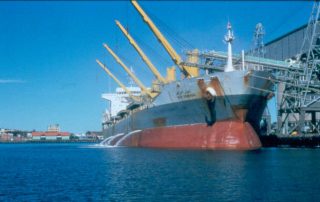Liberia Proposes More Time for Shipowners to Adjust to BWMS

The Liberian Maritime Administration is to introduce a proposal to the meeting of the IMO Marine Environmental Protection Committee (MEPC70) in London on October 24 to allow certain ships additional time beyond 2020 to install adequate ballast water management systems.
In order to allow more time for new systems to become available and for shipowners to decide which system to invest in and install, bearing in mind that the cost to retrofit a BWMS is estimated to be up to USD 5 million per ship, Liberia has proposed that shipowners may decide if they wish to renew a ship’s International Oil Pollution Prevention (IOPP) certificate earlier than scheduled in order to have an additional 4 to 5 years to see if new equipment becomes available.
It was said that the current IMO guidelines are not sufficiently detailed to ensure that BWM systems have been adequately challenged to provide the required confidence that they will meet the required discharge performance standard, regardless of where a ship may operate.
“Having conducted additional assessments of IMO type-approved BWM systems intended for installation on Liberian-flag ships, the Liberian Administration has identified certain potential limitations, which have been listed on the Liberian Type Approval Certificate issued to manufacturers,” David Pascoe, Senior Vice-President, Operations & Standards at LISCR, the US-based manager of the Liberian Registry, said.
Additionally, based on a study by Liberia, the dockyard capacity to fit systems on board ships will fall well short of peak demand, expected to occur in 2020-2021.
Earlier this week, the Republic of the Marshall Islands (RMI) Registry said that it will support proposals under which the shipowners would be granted a five-year trial period to comply with the Ballast Water Management Convention (BWMC).
The registry recognized the difficulties and possible complications caused by its introduction, both in the implementation process as well as commercially.
HEADLINES
- Do shipping markets want Biden or Trump for the win?
- All 18 crew safe after fire on Japanese-owned tanker off Singapore
- Singapore launching $44m co-investment initiative for maritime tech start-ups
- Cosco debuts Global Shipping Industry Chain Cooperation Initiative
- US warns of more shipping sanctions
- China continues seaport consolidation as Dalian offer goes unconditional